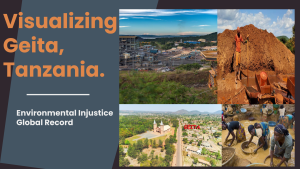Visualizing Geita
xxxx

xxxx


Essay for the double-panel "Beyond Environmental Injustice", 81st Annual Meeting of the Society for Applied Anthropology, March 22-27, 2021.
In their introduction, Vermeylen's argument for a particularist and decolonial approach to justice through a recognition of plural ontologies and epistemologies that decenters Western liberal discourse and its theory of justice. How does bringing the lens of coloniality into environmental justice literature alter our visions of energy futures? Can we make appeals to environmental justice without recourse to liberal theories of individual rights and property ownership? More specifically, I am wondering how our team can study and address this dynamic plurality of ways of understanding and experiencing in/justice in this site, and how can we engage this plurality in productive ways? What axes of difference and inequality should we be looking for/at (race, gender, class, sexual orientation, citizenship, housing status, etc)? If the Anthropocene is coloniality by another name, how can we foreground this in our approach?
The authors productively place three bodies of theory in conversation, abolitionist theories, urban political ecology, and decolonial theory, to rewrite the intellectual trajectories of EJ as extending the legacy of the Black Radical Tradition. What are our intellectual and political genealogies as students and researchers of the quotidian anthropocene? What genealogies are we pushing against? Drawing from their examples of spaces and historical moments of interracial solidarity, what kinds of coalitions do we see ourselves partnering with and contributing to as (largely?) newcomers to the activism in Austin?
In this fascinating review, the authors show how environmental justice is reproductive justice (following the water protectors at Standing Rock) and how this intersection reshapes understandings of the environment, embodiment, and exposure. I was particularly interested in the concepts of social and cultural re/production, and how we might think about this in light of Austin's rapid gentrification. They discuss an intersectional approach as a multi-scalar approach, from climate change to chemical exposure in the home - and I think this could be extended to a inter/multi-generational approach to justice (esp given our focus on renewables). The authors show how the RJ framework rethinks the individualism of reproductive choice as the right to conceive and bear children in conditions of social justice and human flourishing - then how does the current energy system (and future energy transitions) negate or create these conditions, and for whom? If we think about biological/cultural reproduction, how do we also incorporate the concept of reproductive labor into our analysis? Finally, I think they make an important point about the harms of documentation, and it would be great to hear everyone's thoughts (Esp those who have participated in earlier field campuses) on what the goal and ethics of our knowledge production are?
Walsh's piece gives us a concise history and geography of environmental racism in Austin, by drawing our attention to how ineequality is written into city law and urban planning. The ongoing legacies of segregation have shaped social life from access to public services to access to recreational spaces. Given the foundations of environmental racism in zoning laws and land use regulations, so succinctly highlighted by Walsh, how does/must the process of energy transition address these issues? Can there be zoning for justice, and what would that look like? In what way can our work at the field campus contribute to the existing work being done by orgs like El Pueblo and PODER?
The information in this study can be used to offer help to couples after disasters, as it shows that counseling may be needed to help aleviate some of the issues at hand. While counseling may not be readily available with all of the other disaster relief that is going on, it should be reconized as something that may be necessary to help the recovery process and ensure greater safety.
Emergency response is discussed in the following quote:
"One such intervention, psychological debriefing or critical incident stress debriefing, was developed in the 1980s for emergency responders and has been used with other victims of trauma (46). The technique is applied within 48 h of the traumatic event, during which victims are asked to describe the event and their emotional responses to it in detail. They are also given suggestions of methods to relieve stress (12). Intervention studies, however, have found that this method does not prevent psychopathology and, by strengthening memories of the traumatic event, may impair the natural recovery process and even worsen symptoms (44). Therefore, it is no longer recommended in the immediate aftermath of traumatic event exposure (12, 49)."
This quote shows that the psychological needs of first responders are also considered, not just those of the people who were victims. It shows a weakness in the abilities to heal people afterwards, as this method is no longer recommended. Other methods are being pursued, as the first responders of the world need support and healing too.
Artisanal or Snall Scale Mining in Geita.